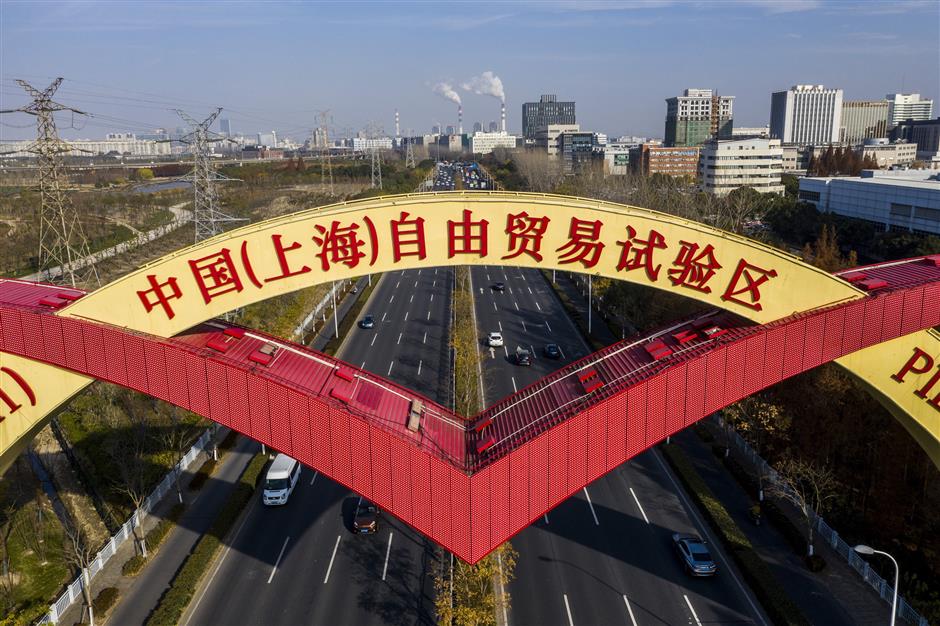政府新闻
上海优化自贸区贸易规则 2024-02-07

Shanghai authorities issued detailed plans on Tuesday to implement high-standard trade rules in the China (Shanghai) Pilot Free Trade Zone to promote trade liberalization and facilitation to align the Shanghai FTZ with the highest international standards.
In response to the State Council's plan to improve the Shanghai FTZ's trade rules released in December, the Shanghai government issued a detailed program containing 117 measures in eight areas, highlighted by optimizing digital economy regulation, improving government procurement, and enhancing financial risk prevention and control, to help build an open and reliable business environment of the highest rank.
The initiative mandated that payment service providers should implement electronic payment services that satisfy international standards and use digital identities for cross-border authentication and electronic identification.
Under the framework of security regulatory supervision, financial institutions are permitted to transmit data of daily operation abroad and handle cross-border assets, and multinational corporations were urged to establish global or regional treasury centers to allow funds to flow freely within the Shanghai Pilot FTZ and beyond.
The initiative laid out ways to make high-standard digital trade happen, like making a digital platform that can be used interactively and connect to the EU's Peppol system. This system allows for electronic data exchanges and the digitization of warehouse receipts and other related documents.
The Shanghai government has proposed establishing a data-sharing framework to facilitate contacts between small and medium-sized enterprizes and offshore organizations, thereby promoting international cooperation.
To make international trade more convenient in Shanghai, the government vowed to exclude certain commodities from duty and tax, exempt imported wines and distilled spirits from labeling, and establish precise labeling standards for medical devices imported into the FTZ.
The program also included guidelines for protecting trademarks and geographical indications, standardizing and applying artificial intelligence technology, and managing government procurements.
Since the establishment of the Shanghai FTZ in 2013, the Pudong New Area has established nearly 19,000 new foreign-invested projects, with a total foreign registered capital of more than US$200 billion, and the scale of trade in goods has increased from 1.5 trillion yuan (US$210 billion) in 2013 to 2.5 trillion yuan by the end of 2022.
The new trade rules are in eight areas:
1. Accelerate the expansion and opening-up of trade in services
Facilitate electronic payment services and cross-border transmission of financial data, support the development of financial innovation, and optimize telecommunications services.
Specific measures include launching electronic payment systems that are in line with international standards, using digital identity in the payment field, allowing financial institutions to transmit daily data abroad under the security regulatory framework, and supporting multinational companies to set up global or regional treasury centers, etc.
2. Enhance the liberalization and facilitation of trade in goods
Promote the import of goods, encourage the development of the commercial cryptography industry, upgrade the level of customs clearance facilitation, support innovation in logistics business models, and improve customs supervision and enforcement.
Specific measures include: allowing bonded maintenance goods to be converted to domestic sales, exempting imported wines and distilled spirits from labeling, simplifying quarantine measures for specific types of imported goods, and improving the management of the import of commercial cryptographic products.
3. Implement high-standard digital trade rules
Regulate and promote cross-border flow of data, promote the application of digital technology as well as the open sharing of data.
Specific measures include the designation of important data catalogs, the use of electronic bills, the promotion of the medical industry and the integration of artificial intelligence technology.
4. Strengthen intellectual property protection
Strengthen the protection of trademarks and geographical indications, improve the patent protection system.
5. Reform government procurement procedures
Optimize procurement procedures, refine government procurement management, and strengthen procurement supervision.
6. Reform post-border management system
Deepen the reform of state-owned enterprises, strengthen the protection of labor rights and interests, and enhance environmental protection.
7.Strengthen risk prevention and control system
Improve the risk assessment mechanism, build an early warning system for risk, and strengthen financial risk prevention and control
8.Strengthen the policy implementation
Strengthen the publicity of policies, training and building up human resources
Source: Shanghai Daily
